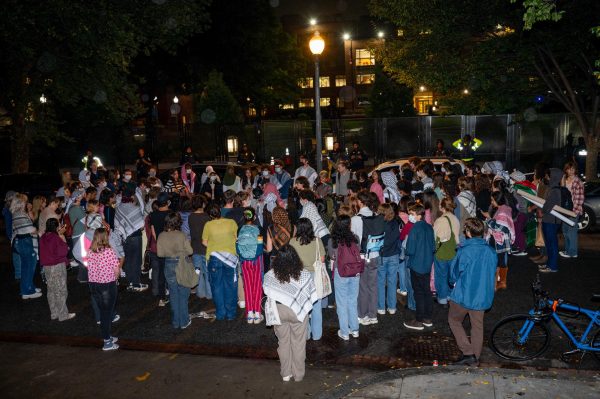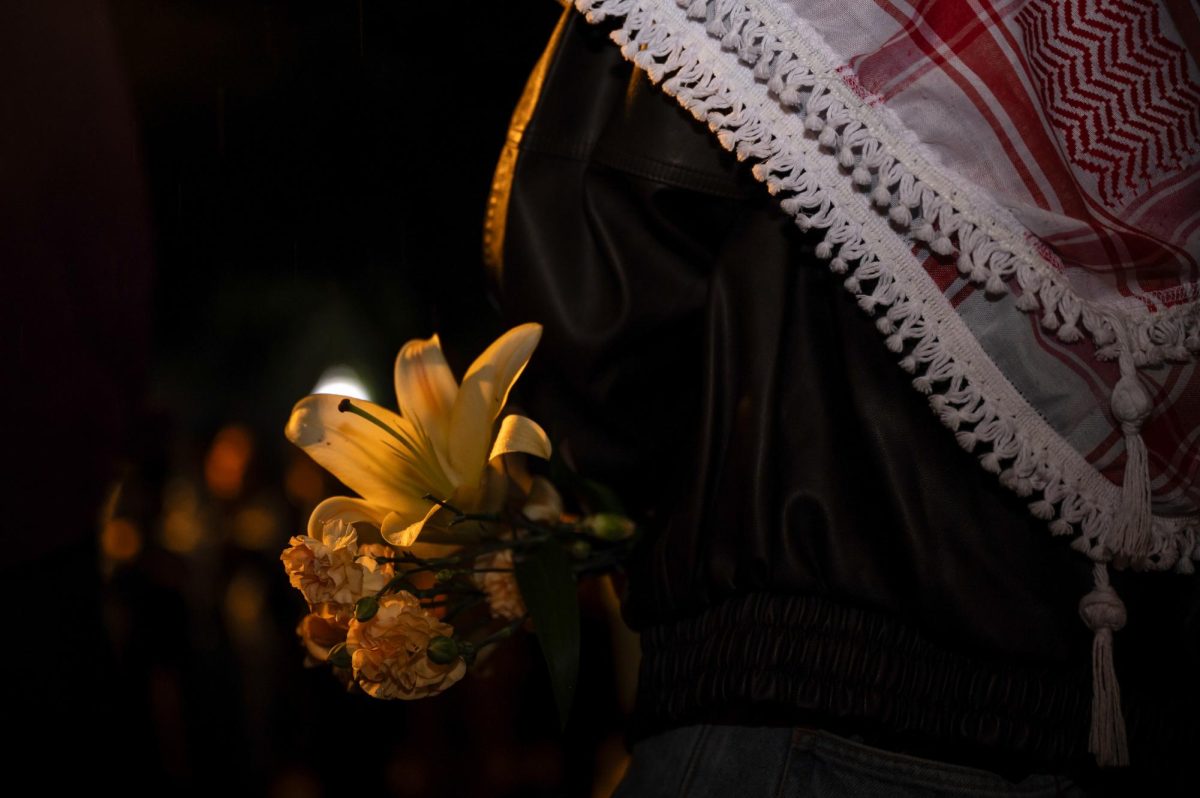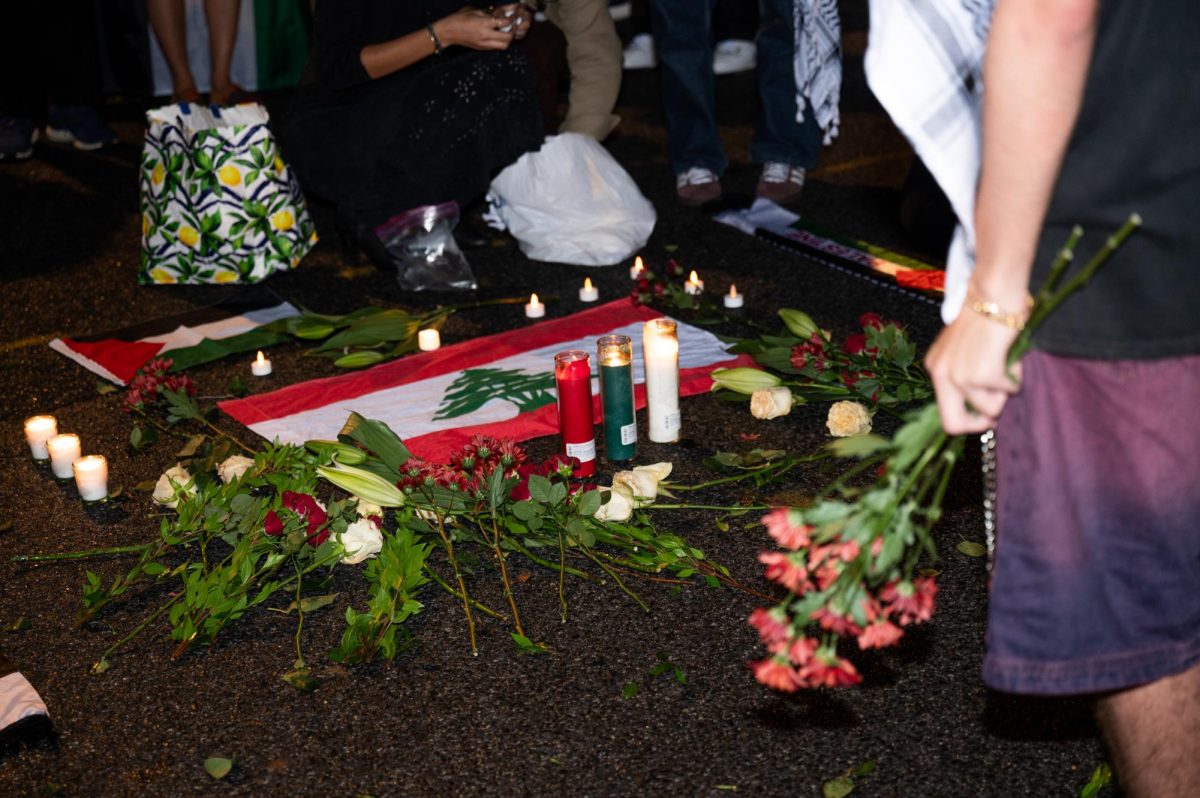More than 70 students gathered on H Street outside a fenced-off University Yard on Wednesday night to mourn Lebanese and Palestinian people who have been killed by the Israeli military.
Participants covered a section of H Street with Lebanese and Palestinian flags, candles and roses, which they then gathered around to pray and hear speeches from the GW Lebanese Student Association, GW Students for Justice in Palestine, the GW Arab Student Association and other students. The Student Coalition for Palestine at GWU announced the vigil in an Instagram post Sept. 30 — the day Israel initiated a ground operation in southern Lebanon — inviting students to “come together as a community.”
Israel’s military on Monday crossed its border into southern Lebanon to attack Hezbollah — a Lebanese military group that the United States recognizes as a terrorist organization — following Israeli airstrikes over the last few weeks, which have persisted in the days following the land invasion. Over the last two weeks, the Israeli military is estimated to have killed at least 1,400 people in Lebanon and displaced an additional 900,000 people.
Israel has simultaneously continued its military operations in the Gaza Strip, killing at least 51 people in the south, eight in the north and 17 in the east Wednesday.
“Find strength in your grief, and realize that your grief, it is resistance in itself,” said a student speaker from the Arab Student Association. “The fact that you are a human being that sympathizes, empathizes and fights for us means that you have not lost your humanity yet.”

Officials closed the gates to U-Yard ahead of the 7 p.m. vigil, according to a security guard stationed near H Street. The fences around U-Yard — which officials installed to block off U-Yard after local police cleared the pro-Palestine encampment last spring — are supposed to be open daily from 6 a.m. to 11 p.m.
A representative for the coalition said the group had previously booked U-Yard for the vigil and cleared it with the University, but right before the event, officials told students they had to relocate to Potomac Square due to the anticipated number of people attending and concerns from officials about “outside agitators.”
“GW has consistently tried to ensure that our grief and our pain is something that remains hidden from the general public,” the representative said. “They want us to grieve behind walls. They want us to mourn in a way that doesn’t disrupt normal university function.”
At the vigil, a speaker from the Lebanese Student Association spoke about the shared pain that Lebanese people and Palestinians are facing as a result of Israel’s violence.
“For Lebanese people around the world, this has been an unspeakably painful week,” the speaker said. “And for Palestinians, it has been a year of unimaginable suffering. We sincerely hope that you and your loved ones are safe, though we know that for many of us that is tragically not the case.”
The speaker also told the crowd not to trespass on or destroy any GW property to avoid conflicts with the surrounding police officers.
“Please do not trespass on the GW yard or cause harm to any university property, as it could endanger members of our community,” the student said. “Anyone who does not respect the sanctity of this event will be asked to leave. Our priority tonight is to honor those who we have lost.”
At least 10 GW Police Department officers and 20 Metropolitan Police Department officers — including GWPD Chief James Tate and MPD Special Operations Commander Jason Bagshaw — stationed themselves on and around H Street.
MPD closed H Street to traffic and the University sent out a GW Alert at 7:32 p.m. that said the 2000 block of H Street was closed to vehicles due to “expressive activity.” During the vigil, six MPD officers on bicycles stood along the fences guarding U-Yard.
At the vigil, a representative from the DMV Students for Justice in Palestine Coalition told the crowd to continue protesting against the “Zionist state” and honoring the people fighting against suppression in Arab countries.
“This grief threatens to overwhelm us, but we owe it to our martyrs, our prisoners and all of our people to continue to resist,” the representative said. “Sit with your grief, mourn in community but ultimately, we must allow this grief to motivate us to recommit ourselves to liberation.”
The representative said officials wanted to move their vigil to Potomac Square so that fewer people would see their grief, but the movement requires they “create crisis” for those in power and keep up resistance.
“It is not just our people back home who resist,” the representative said. “The struggle that we engage in here in the beating heart of empire is vital to this movement, from fighting for total divestment from genocide profiteers to refusing to allow GW to move our vigil behind walls because administrators decided that our grief would be too disruptive.”
The demonstration follows months of campus discourse, protests and discussions between student organizers and officials where the organizers demanded that GW divest from companies tied to Israel and disclose all financial investments. On Sept. 18, the coalition said they “walked away” from discussions with GW officials, who they claimed rejected conversations that would result in “material outcomes,” according to the coalition’s Instagram post.
The conflict between Lebanon and Israel intensified when Israel targeted Hezbollah members on Sept. 17 by coordinating the explosion of hundreds of pagers used by the organization, killing at least 37 people and injuring thousands. Following Israel’s assassination of the leader of Hezbollah and subsequent rocket fire between the two countries, Israel launched a ground invasion into Lebanon on Monday and continued airstrikes.
Organizers then allowed various speakers to lead the crowd in prayers to honor those lost in the conflicts. At about 7:45 p.m., organizers opened up the vigil to anyone who wanted to address the crowd. Multiple students read poems and gave remarks about the conflict, including one Jewish student who said they came to the vigil instead of celebrating Rosh Hashanah, the Jewish new year, as “repentance” for the “sins” Israel had committed.
“The sins of my people — and yes, they are the sins of my people — will somehow be washed away by the action of me and millions and millions of other Jews,” the student said. “Palestine will be free.”
Another student read a poem by Marcellus Williams, a Black Muslim man whom the state of Missouri executed Sept. 25 for a murder he and his attorneys have steadfastly maintained he did not commit.
The crowd started to disperse voluntarily at about 8:20 p.m., with some people staying to talk with one another and others silently standing around the candles.






